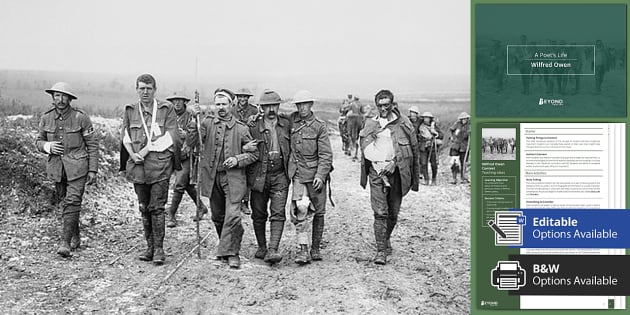

"My friend, you would not tell with such high zest to children ardent for some desperate glory, The old Lie: Dulce et decorum est. Pro patria mori.”
 exposure wilfred owen
exposure wilfred owen  dulce et decorum est
dulce et decorum est  war poetry
war poetry  power and conflict poetry
power and conflict poetry  jessie pope
jessie pope  disabled wilfred owen
disabled wilfred owen  exposure
exposure  english worksheets
english worksheets  dulce et decorum est poem
dulce et decorum est poem  ww1 poetry
ww1 poetry  war poets
war poets  the sentry wilfred owen
the sentry wilfred owen  the sentry
the sentry 
PHSE, discussing the realities of war against the glorification of war. Thinking of critical thinking to evaluate.
"My friend, you would not tell with such high zest to children ardent for some desperate glory, The old Lie: Dulce et decorum est. Pro patria mori.”
Beyond's Wilfred Owen Context Pack introduces students to one of the most significant War Poets, asking them to consider the context and historical background of Owen and how it influences his work. Using this lesson, students will:
If you're looking for more work on Wilfred Owen, click here. We also have this handy analysis resource for his poem 'Exposure'.
Wilfred Edward Salter Owen was born 18 March 1893 in Oswestry, Shropshire. He was the eldest of four children.
In 1903 or 1904 he went on a holiday to Cheshire and began to write poetry. At first he was very influenced by the Romantic Poets of the 18th and early 19th centuries.
He took some courses in botany at university but then, in 1913, he went to France as a language tutor. When war broke out he didn’t enlist but returned to England.
In October 1915 Wilfred Owen volunteered and joined the Artists' Rifles. Eight months later (4th June 1916) he was commissioned as Second Lieutenant in the Manchester Regiment and in December 1916 he left for the Western Front.
After a last luxurious night in a Folkestone Hotel, Owen was quickly plunged into the realities of active service. He wrote home to his mother often about his experiences.
Initially Owen had contempt for his men. He called them ‘expressionless lumps’ but he soon realises what battle is really like. Over the course of the next few months, Owen fell into a shell hole, was blown into the air by a trench mortar and spent several days lying on an embankment in Savy Wood with, what he believed to be, another soldier’s remains.
He was diagnosed with shell shock (what we would now refer to as Post Traumatic Stress Disorder) and sent to Craiglockhart Hospital in Edinburgh to recuperate. At the hospital he met another poet,
Siegfried Sassoon, who he began to idolise. He showed Sassoon some of his poetry and began to adopt some of Sassoon’s more realistic qualities in his writing.
 Home
Home  Membership
Membership  TwinklCares
TwinklCares  Create
Create  Blog
Blog 